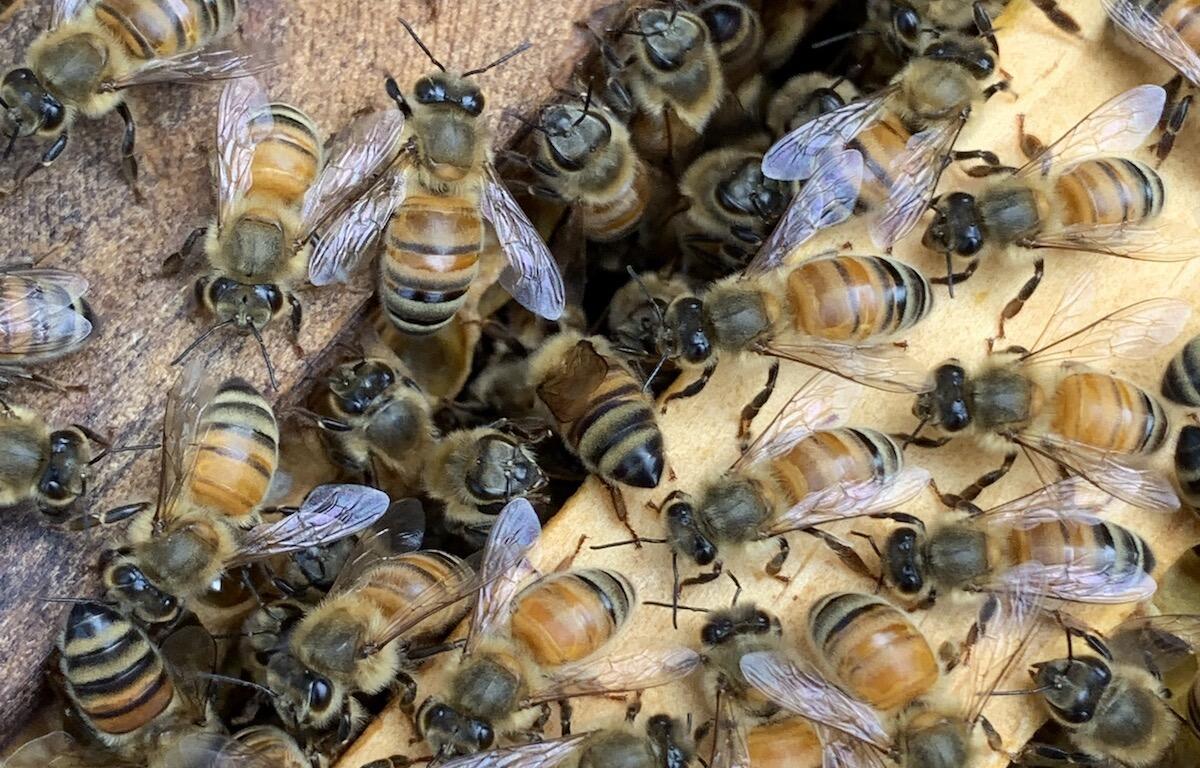CLARKSVILLE, TN (CLARKSVILLE NOW) – Spring means the annual return of many insects, and while some are perceived as nuisances, others are actually of paramount importance to all other life forms.
Bees are no exception to this, and in fact are some of the most important insects as they help with pollinating many plants that are the basis of our ecosystem.
Clarksville Now spoke with Wes Powell, the assistant director of landscape and ground in the physical plant at Austin Peay State University, and Alexandra Wills, director for the Center of Service Learning and Community Engagement at APSU, about the importance of bees.
Common misconceptions
APSU has three beehives on their physical campus, and several others at the Farm and Environmental Education Center in Clarksville.
Students at Austin Peay in the beekeeping course learn about hive construction and bee biology. They also partner with the local school system to equip teachers with tools to teach about bees and pollinating, which is the transference of pollen from one plant to another, which fertilizes the plants and allows for the creation of seeds.
Wills also said she works with these students to clear up some of the misconceptions about bees through the APSU Service Learning center.
“Honey bees are actually not native to North America. We have lots of native bees, about six of them, that are native to this area but they don’t produce honey,” Wills said.
But it’s not just the honey that is a valuable bee product. They also produce beeswax that is used in some medical supplies and self-care products, and royal jelly that is often used as a natural supplement for older people.
Another misconception is that bees are out to sting you.
“Their main purpose in life is to support their hive, and it is not to sting somebody. It’s to protect the hive. If we were to go over here and shake their hive and pose a threat to them, yes we would get stung,” Powell said.

Swarm season
Spring is also swarm season, which means it’s not uncommon to see big piles of bees that have chosen a mailbox or car to land on. This can be a pretty alarming sight.
“The bees are just looking for a new home, and in that swarm, there is a queen bee, and she’s the one that decides, ‘This is where we are landing,’ and then all of the other bees come to her,” Wills said.
Wills added that it’s best not to freak out if you come across a swarm.
“They’re actually calm and docile while they’re in the swarm. They have no desire to leave the swarm and chase you. They’ve actually just eaten a whole bunch of honey out of their hive and are hanging out with the queen trying to figure out what are we doing,” Wills continued.
Instead of panicking and calling an exterminator to potentially kill the bees, Wills said it is better to call a local beekeeper to come a get the colony for rehoming.
“You can go online, go on Facebook and find one of our beekeeping organizations, and bee keepers will come and try to capture that swarm for you and remove it and then they’ll actually try and rehome them into a hive somewhere else so they can save those bees,” Wills said.
Even the bees living in the hives at APSU’s campus are prone to swarming. In fact, a student’s car was overtaken by bees last month after one of Wills’ colonies split in two, and the queen bee decided to land on the car’s tail light.
“They got inside her tail light and bumper, and we were able to collect probably 90% of the hive. The queen decided to be deep inside the car so she stayed in there and maybe 500 bees stayed with her or didn’t get collected,” Powell said.
Without their queen, Powell said the bees they were able to remove were rehomed in a new hive, and began working on hatching a new queen.

How to BEE kind
The pollination that bees, bats, birds and other insects do is important for plant regeneration, but also for human survival.
“There have been multiple studies that show the importance of pollinators, but especially in relation to food that we eat. About one-third of everything that humans consume is a direct result of pollination,” Powell said.
This includes the livestock that humans consume, because they also eat grasses and other plants to survive.
“They pollinate our vegetables, fruits, trees, flowers and a lot of these things won’t happen if we don’t have pollinators,” Wills said.
And losing these helpful pollinators due to colony collapse disorder and pesticide misuse is not just a threat to bees, but most other life forms.
“Bees are quickly kind of missing from our environment due to pesticides and other types of control that we’re trying put put over our landscapes, so we’re trying to bring a lot of attention to help save our pollinators,” Wills continued.
One of the best things you can do to help bees is to avoid broad spectrum pesticides, which are incredibly harmful to beneficial insect populations and bees.
“If you understand insects, learn what is a beneficial insect versus what’s a detrimental one, you can save yourself money on chemicals. You can save the environment, protect our waterways and keep our pollinators happy and healthy,” Powell said.


